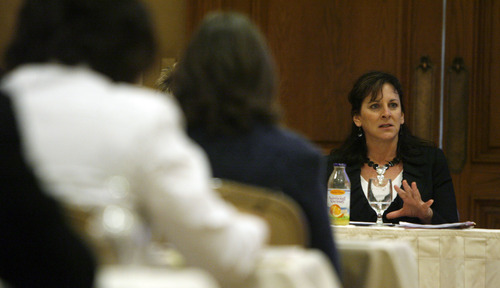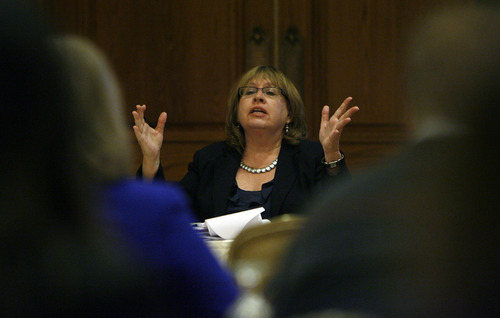This is an archived article that was published on sltrib.com in 2011, and information in the article may be outdated. It is provided only for personal research purposes and may not be reprinted.
Utah women's paychecks on average are alarmingly low when compared to male counterparts, and sometimes the only way to right that wrong is to sue, an attorney for the Equal Employment Opportunity Commission who has prosecuted discrimination cases for 30 years told a Salt Lake City crowd on Monday.
Mary Jo O'Neil was among panelists at the EEOC's Fair Pay Event at Little America Hotel discussing the pay gap between men and women in the workplace.
Utah ranks near the bottom in equal pay for women, with full-time female workers earning $31,000, compared with $45,000 for men. The pay gap is even greater when comparing college-educated Utah workers, with women earning $45,000, versus $65,000 for men, according to the American Association of College Women.
"These are alarming statistics," said O'Neil. "Sometimes, in order to change the hearts and minds of society, you've got to sue."
Nationally, women are paid an average of only 77 cents for every dollar paid to men — or 69 cents for Utah women when compared to their male counterparts. Pay discrimination may start early in women's careers, often because they take what's offered rather than negotiating for more, said Krista Watson, of the EEOC's Phoenix office.
Still, only 3 percent of women in the workforce sue, she said. Despite the low number, the EEOC has received almost 33,000 charges alleging sex-based wage discrimination since 1997.
And now women have another legal weapon because they can bring complaints for alleged discrimination that occurred years ago, with the 2009 passage of the Lilly Ledbetter Fair Pay Act, Watson said.
The legislation is named for an Alabama woman who brought an employment discrimination suit against Goodyear Tire & Rubber Co. From 1979 until her retirement in 1998, the suit alleged that Ledbetter's pay fell significantly behind that of her male counterparts.
In 2007, the U.S. Supreme Court ruled against her, saying workers could not bring a suit if claims were based on employer decisions made more than 180 days prior. Congress then revised the statute of limitations, restarting the 180-day clock each time a worker receives a paycheck, said Watson.
She added that employers get into trouble when they steer employees into lower-paid positions or deny them networking and training opportunities that lead to promotions or higher-paid positions.
Watson said the key to determine whether workers are paid equally is to focus on what they actually do on the job, not their titles or departmental designations.
Employers should have a formal pay structure, and conduct annual salary reviews to be fair to workers and protect themselves against litigation, said Monica Whalen, president and CEO of the Employers Council, a nonprofit employer association. She added there should be a process in which workers may air grievances "early on, and without fear of retaliation."
Utah's pay gap
The state is near the bottom in equal pay for women, with full-time male workers earning $45,000 to a female's $31,000.
The state is No. 41 in wages for college-educated workers, with full-time men earning $65,000, compared with women's $45,000.
Source: The American Association of University Women —
Where to go for help
If you believe you've been subjected to unlawful pay discrimination, contact the Equal Employment Opportunity Commission at 800-669-4000 (the number for hearing impaired is 800-669-6820) or visit http://www.eeoc.gov.





